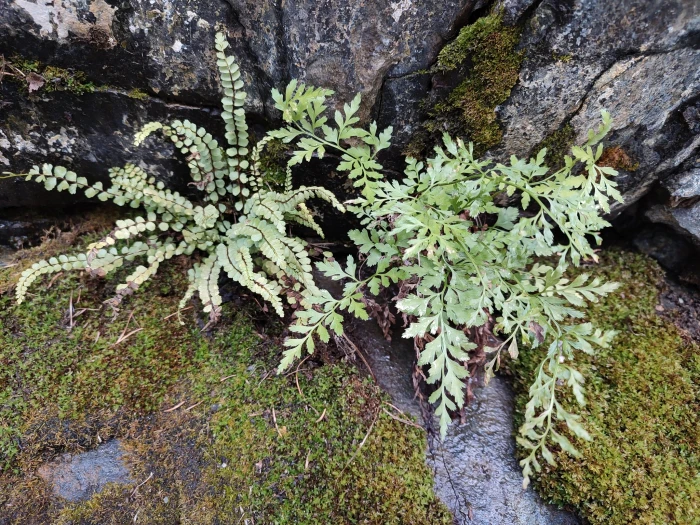Wedge-Leaf Spleenwort
(Asplenium cuneifolium)
Wedge-Leaf Spleenwort (Asplenium cuneifolium)
/
/

Erwin Gruber
CC BY 4.0
Image By:
Erwin Gruber
Recorded By:
Copyright:
CC BY 4.0
Copyright Notice:
Photo by: Erwin Gruber | License Type: CC BY 4.0 | License URL: http://creativecommons.org/licenses/by/4.0/ | Rights Holder: Erwin Gruber | Publisher: iNaturalist | Date Created: 2022-02-17T15:10:35-08:00 |
























Estimated Native Range
Climate Requirements for Elmhurst, Illinois
| This Plant | Your Site | Plant Suitability for Your Location | ||
|---|---|---|---|---|
| • Precipitation | 19" - 75" | 37" | Aquatic | Aquatic |
| • High Temp. | 47°F - 90°F | 85°F | Your summer temperatures are normal for this plant. | Excellent |
| • Low Temp. | 10°F - 61°F | 14°F | Your winter temperatures are normal for this plant | Excellent |
This plant may not grow well at your location - your precipitation is too high.
Summary
Asplenium cuneifolium, commonly known as Wedge-leaf Spleenwort, is a fern native to Europe. It is often found growing epiphytically on tree trunks and lithophytically on rocky slopes. This species exhibits a moderate growth rate and typically reaches a height and width of 1-1.5 feet (0.3-0.5 meters). The fronds are glossy and dark green, with a unique wedge-shaped appearance that gives the plant its common name. The plant does not produce flowers or seeds, as it reproduces via spores that are located on the underside of the fronds.
Wedge-leaf Spleenwort is valued for its lush, evergreen foliage and its adaptability as a houseplant or in shaded garden areas. It is often used in terrariums, as a ground cover in shaded gardens, or mounted on tree trunks in a manner similar to its natural epiphytic growth habit. In cultivation, it requires consistent moisture but well-draining soil to prevent root rot. It thrives in part shade to full shade and prefers a humid environment. While generally disease-free, it can be susceptible to scale insects and mealybugs. It is important to avoid direct sunlight, which can scorch the fronds, and to ensure good air circulation to prevent fungal diseases.CC BY-SA 4.0
Wedge-leaf Spleenwort is valued for its lush, evergreen foliage and its adaptability as a houseplant or in shaded garden areas. It is often used in terrariums, as a ground cover in shaded gardens, or mounted on tree trunks in a manner similar to its natural epiphytic growth habit. In cultivation, it requires consistent moisture but well-draining soil to prevent root rot. It thrives in part shade to full shade and prefers a humid environment. While generally disease-free, it can be susceptible to scale insects and mealybugs. It is important to avoid direct sunlight, which can scorch the fronds, and to ensure good air circulation to prevent fungal diseases.CC BY-SA 4.0
Plant Description
- Plant Type: Ferns
- Height: 1-1.5 feet
- Width: 1-1.5 feet
- Growth Rate: Moderate
- Flower Color: N/A
- Flowering Season:
- Leaf Retention: Evergreen
Growth Requirements
- Sun: Part Shade, Full Shade
- Water: Medium
- Drainage: Fast, Medium
Common Uses
Low Maintenance, Potted Plant
Other Names
Common Names: Forked Spleenwort , Bird’s Nest Fern
Scientific Names: Asplenium cuneifolium , Asplenium fissum , Asplenium lamotteanum
GBIF Accepted Name: Asplenium cuneifolium